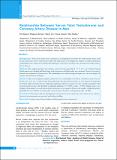Please use this identifier to cite or link to this item:
https://hdl.handle.net/20.500.14356/1428| Title: | Relationship Between Serum Total Testosterone and Coronary Artery Disease in Men |
| Authors: | Bashyal, Ritu Koirala, Bhagawan Jha, Bharat Gautam, Bijaya Khadka, Mira |
| Citation: | BashyalR., KoiralaB., JhaB., GautamB., & KhadkaM. (2019). Relationship Between Serum Total Testosterone and Coronary Artery Disease in Men. Journal of Nepal Health Research Council, 17(01), 26-31. https://doi.org/10.33314/jnhrc.v17i01.1207 |
| Issue Date: | 2019 |
| Publisher: | Nepal Health Research Council |
| Article Type: | Original Article |
| Keywords: | Coronary artery diseases Diabetes mellitus Gensini score Testosterone |
| Series/Report no.: | Jan-March, 2019;1207 |
| Abstract: | Abstract Background: Male sex has always been considered as an independent risk factor for cardiovascular disease. But recent studies have shown controversial results. This study aimed to investigate the relation of serum testosterone withrisk factors of coronary artery diseasesand with degree of severity of coronary artery stenosisin men with coronary artery diseases. Methods: After applying inclusion and exclusion criteria 102 men (aged 60.42 += 11.11), were included. Fasting blood sample were obtained and blood sugar, total testosterone and lipid profile were measured. Severity of coronary stenosis was estimated by Gensini score. The relationships were assessed using chi-square test, one way analysis of variance and Pearson’s Correlation. Results: Of the total 102 patients, majority of them 42 (41.2%) had triple vessel disease. Testosterone (nmol/L) was found to be 12.01 ± 6.1. Cardiovascular diseaserisk factors like age, body mass index etc. were found to be negatively correlated with testosterone but not statistically significant. Likewise, Gensini score also correlated negatively with testosteronebut not up to the threshold of statistical significance (r=-0.069, p-value = 0.496). Similar results were obtained when number of vessels involved and testosterone were compared. However, the number of diabetic patients gradually decreased with the increasing value of testosterone in the three tertile group (p-value = 0.040). Conclusions: This study could not find significant association between testosterone and coronary artery diseases, however low testosterone was associated with diabetes mellitus. Keywords: Coronary artery diseases; diabetes mellitus; gensini score; testosterone. |
| Description: | Original Article |
| URI: | http://103.69.126.140:8080/handle/20.500.14356/1428 |
| ISSN: | Print ISSN: 1727-5482; Online ISSN: 1999-6217 |
| Appears in Collections: | Vol. 17 No. 1 Issue 42 Jan - Mar 2019 |
Files in This Item:
| File | Description | Size | Format | |
|---|---|---|---|---|
| 1207-Manuscript-9264-1-10-20190429.pdf | Fulltext Download | 255.38 kB | Adobe PDF |  View/Open |
Items in DSpace are protected by copyright, with all rights reserved, unless otherwise indicated.
